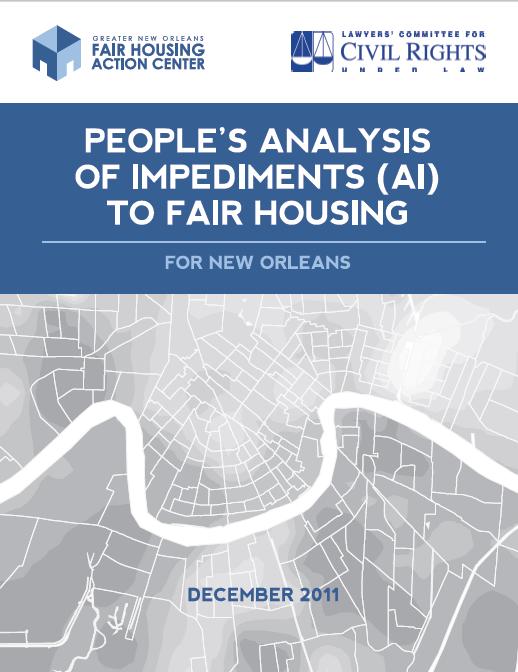Congress originally created the duty to affirmatively further fair housing (AFFH) when it enacted the Fair Housing Act (FHA) in 1968, but enforcement of the duty in the intervening decades has been limited. The duty requires the U.S. Department of Housing & Urban Development (HUD), HUD grhttp://lawyerscom.wpengine.com/project/fair-housing-and-community-development-project/cases-matters/aianamic/antees, and entities involved in the administration of other federal housing and community development programs to take proactive steps to support residential integration and other important goals of the FHA. In recent years, there has been a renewed focus on the duty to AFFH and increasing compliance through the activities described below is a high priority of the Fair Housing & Community Development Project.
Advocating for a Strong Federal Regulation on the Duty to Affirmatively Further Fair Housing
On July 19, 2013, HUD published a Proposed Rule on the duty to affirmatively further fair housing (AFFH). The Proposed Rule clarifies the definition of AFFH, revamps the fair housing planning process by replacing the Analysis of Impediments to Fair Housing Choice (AI) with the Assessment of Fair Housing (AFH), coordinates fair housing planning with other planning efforts, and requires robust public participation in the fair housing planning process. On September 17, 2013, the Lawyers’ Committee submitted a comment letter in support of the Proposed Rule. Lawyers’ Committee affiliates, the Washington Lawyers’ Committee for Civil Rights & Urban Affairs, the Chicago Lawyers’ Committee for Civil Rights Under Law, and the Mississippi Center for Justice, joined the letter. Click here to read the comment letter. Click here to read the comment letter and click here to read the Lawyers’ Committee’s press release on the Proposed Rule.
Following the close of the comment period, the Fair Housing & Community Development Project undertook a review of comment letters submitted by three categories of groups: civil rights organizations, housing and community development organizations, and groups that were critical of the Proposed Rule.
Affirmatively Furthering Fair Housing at HUD: A First Term Report Card
This March 2013 report is the second installment of a two-part review of HUD’s efforts to implement its obligation to affirmatively further fair housing. One month earlier, the Poverty & Race Research Action Council (PRRAC) released a review of HUD housing programs, titled “Affirmatively Furthering Fair Housing at HUD: A First Term Report Card (Part I: HUD Housing Programs).” The present report, produced by the Lawyers’ Committee for Civil Rights Under Law, The National Fair Housing Alliance, and PRRAC, takes the next step and looks at HUD’s record of enforcement of the affirmatively furthering obligation among state and local governments (and public housing agencies) receiving HUD funds.
Click Here to Read Full Report
Greater New Orleans Fair Housing Action Center – Affirmatively Furthering Fair Housing
The Greater New Orleans Fair Housing Action Center (GNOFHAC) is dedicated to fighting housing discrimination in the greater New Orleans area. In December 2011, GNOFHAC and the Lawyers’ Committee released the “People’s Analysis of Impediments (AI) to Fair Housing in New Orleans.” The report provides the City with guidance on how to complete an effective AI, critiques the City’s current AI, and provides a set of recommendations for moving forward. As a result of the efforts of GNOFHAC, the Lawyers’ Committee, and several local partners, the City has agreed to work with these groups to draft a new AI.
In April 2011, GNOFHAC and the Lawyers’ Committee jointly released a handbook entitled “Strategies to Affirmatively Further Fair Housing: Proposals for the City of New Orleans Comprehensive Zoning Ordinance (CZO) and Beyond” to address impediments to fair housing in New Orleans. The handbook recommends strategies to the City Planning Commission as it re-drafts New Orleans’ comprehensive zoning ordinance, to ensure a more just, economically integrated, and livable New Orleans. Strategies include inclusionary zoning and a procedure for developers of supportive housing to request reasonable accommodations. The City Planning Commission will release the next draft of the CZO shortly. Click here to visit GNOFHAC’s website.
Huntington, New York Administrative Complaint
In addition to the ongoing litigation in federal court, the Lawyers’ Committee also filed an administrative complaint against the Town of Huntington, New York with the U.S. Department of Housing and Urban Development (HUD) on March 3, 2011. The complaint focused on the Town’s long history of housing discrimination and its failure to affirmatively further fair housing as required by Section 808 of the Fair Housing Act. That complaint is being investigated by HUD. Click here to read the administrative complaint and here to read more about the litigation against the Town of Huntington.


